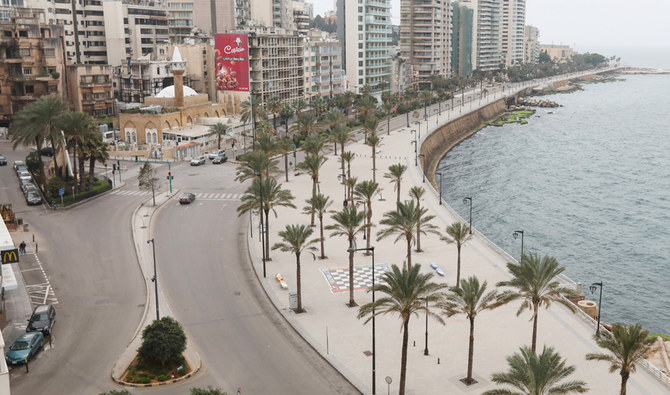BEIRUT: Lebanon is facing at least another two weeks of lockdown to bring the coronavirus crisis under control, a leading health official told Arab News.
Dr. Abdul Rahman Al-Bizri, an infectious disease specialist and member of the emergency committee on coronavirus, said that the Lebanese health system could handle the outbreak “as long as people continue to practice preventive measures seriously.”
His comments came as the number of virus fatalities in the country rose to 10 on Sunday following the deaths of two patients, both in their 80s. Both victims were suffering from chronic illnesses and died in separate Beirut hospitals.
According to the Ministry of Health, the number of confirmed virus cases climbed to 438, an increase of 26 from Saturday, while the number of people in quarantine increased to 1,074.
Health ministry figures show that coronavirus infection extends across all age groups and that Mount Lebanon area remains an infection “hotspot.”
Al-Bizri urged people to follow curfew guidelines and self-isolate where necessary.
“We have not been able yet, through epidemiological surveillance, to know where 10-15 percent of the cases caught their infection. But it is not frightening as long as we still practice preventive measures seriously,” he said. Home quarantine orders are in place around the country, while security services are also monitoring a curfew at night following government moves to curb the spread of the virus.
Meanwhile, the government is facing growing pressure to bring back Lebanese expatriates stranded abroad after Lebanon closed its air, land and sea crossings on Feb. 20 as part of measures to counter the pandemic.
Most of those seeking to return are in African countries where the outbreak was limited when Lebanon shut down its airports.
However, the Lebanese Ambassador to Rome, Mira Daher, said that Lebanese students in Italy “do not want to return and none of them is infected with the virus.”
Students are remaining at home, but want banking procedures eased to allow their families to send money, he said.
FASTFACT
The number of virus fatalities in Lebanon rose to 10 on Sunday following the deaths of two patients, both in their 80s.
The campaign to help expatriates return has been led by Parliamentary Speaker Nabih Berri, who warned that he may suspend participation in the government and set a Tuesday deadline for Lebanese airspace to be opened to allow expatriates to fly home.
Lebanon’s Prime Minister Hassan Diab has refused to reopen the airports, saying Lebanese abroad had been given a time limit to return before the airspace was closed.
The government is expected to make a final decision on Tuesday regarding expatriates’ return, although it is unknown how many will want to return at their own expense. Al-Bizri told Arab News that “if these Lebanese are getting medical care where they reside, it is better that they do not come to Lebanon, but if medical care is not available to them, no one should prevent them from returning.”
He ruled out a return of expatriates in under two weeks and said that any repatriation should happen in stages to avoid overtaxing the health system.
The Amal Movement, headed by Berri, said that a hotel in Marawaniya, in the south of the country, would be equipped as a health isolation center for expatriates.
MP Ziyad Aswad, from the Free Patriotic Movement, criticized calls for expatriates to be returned. “After more than four weeks of protection measures against coronavirus, everyone has got used to it,” he said.
Security forces joined Lebanese people to salute health staff and the Red Ross on Sunday night, offering public applause for their work at Rafik Hariri University Hospital in Beirut.




























